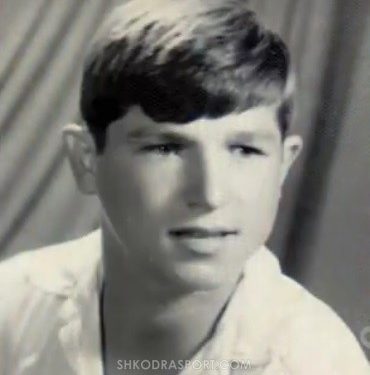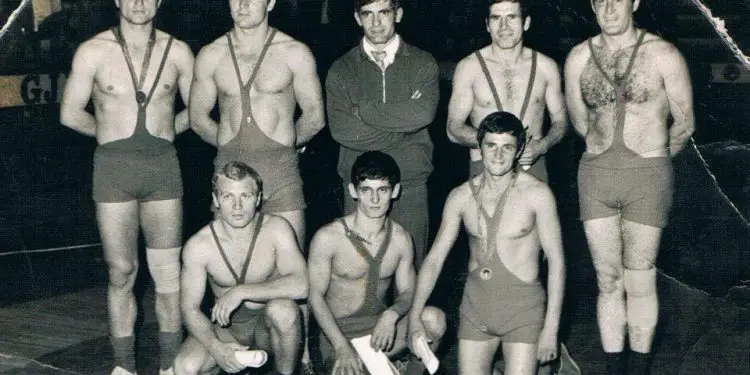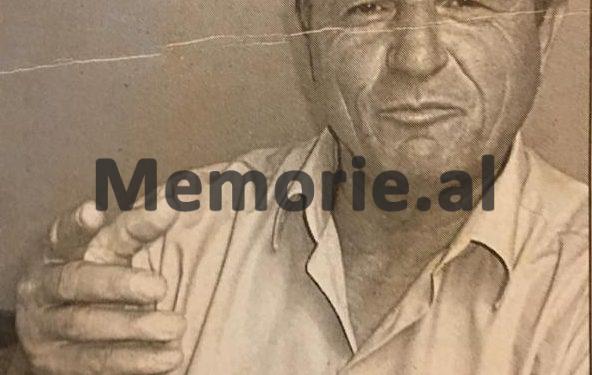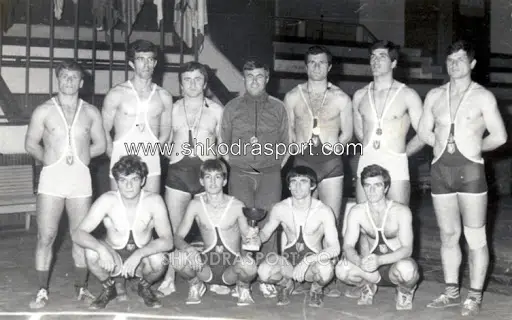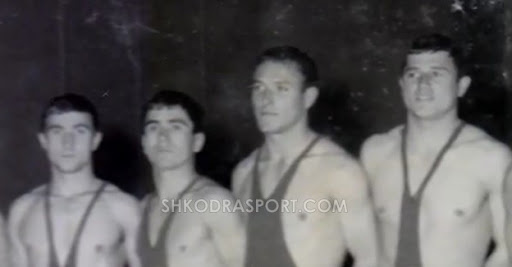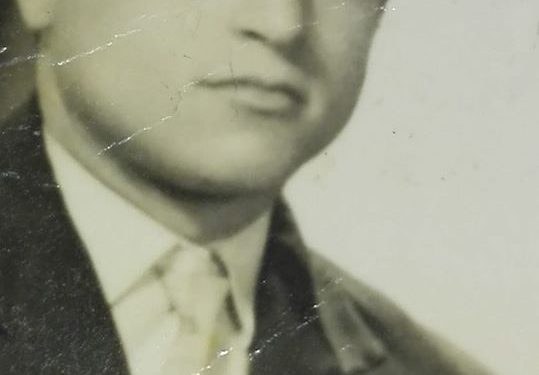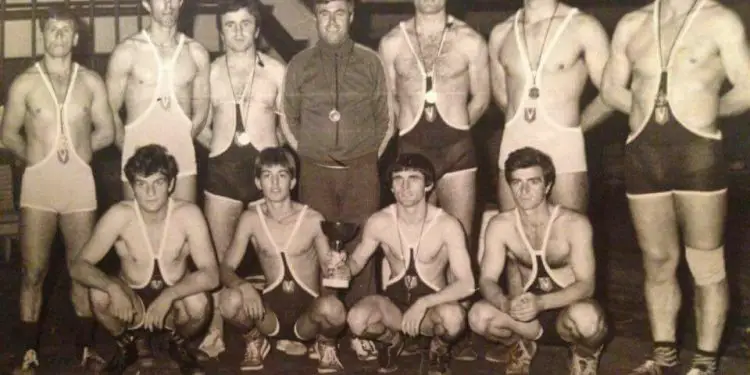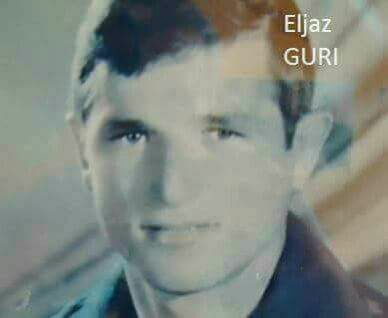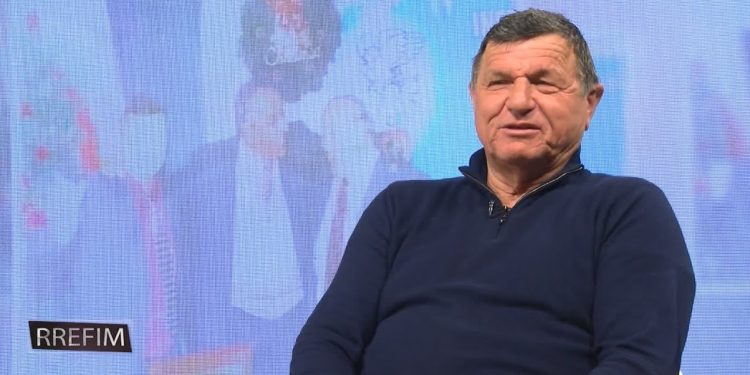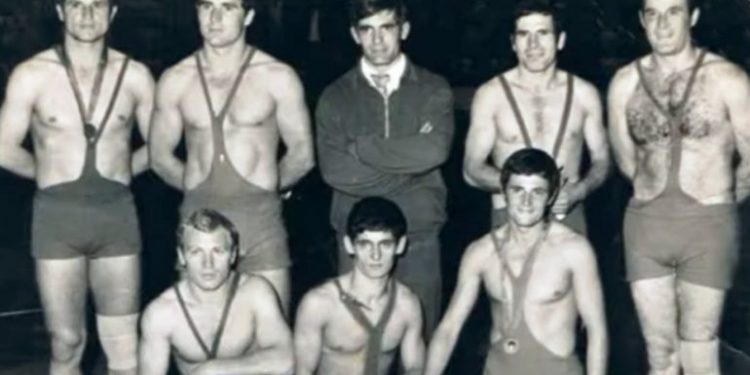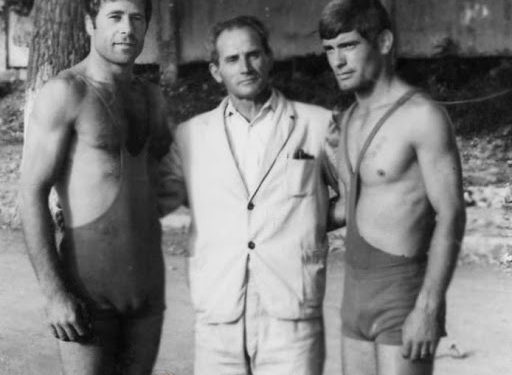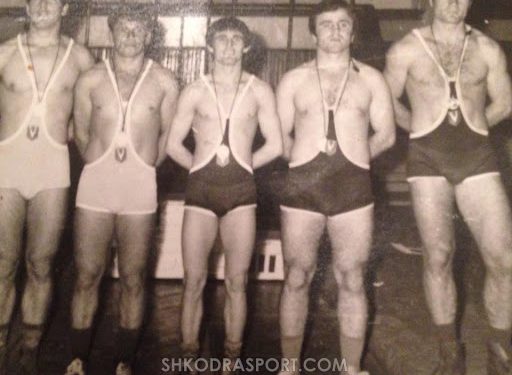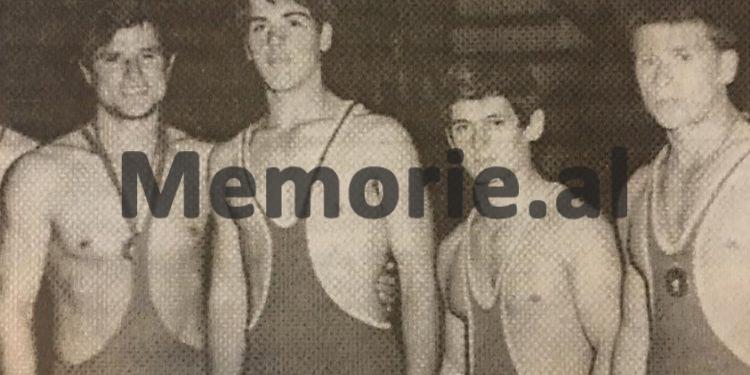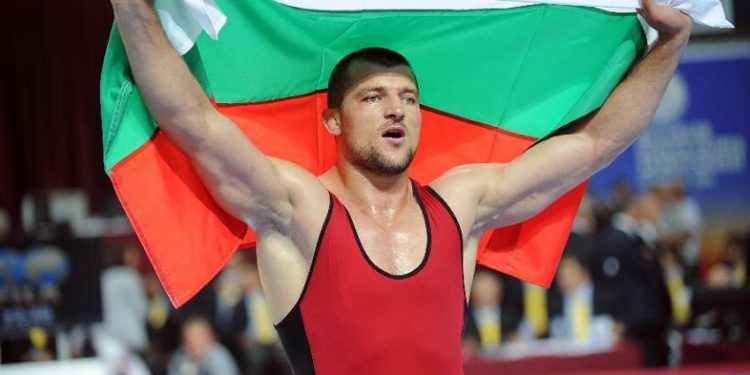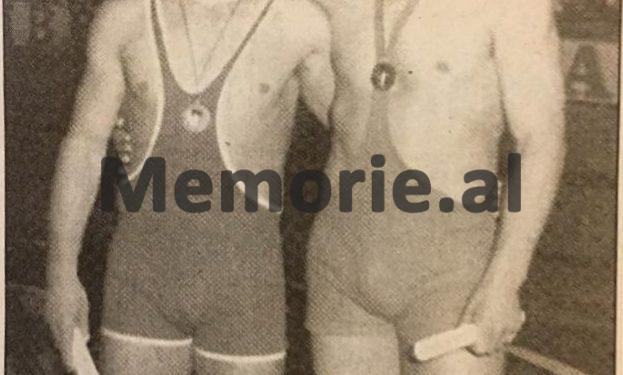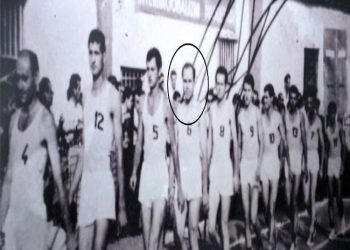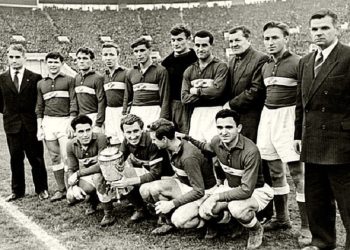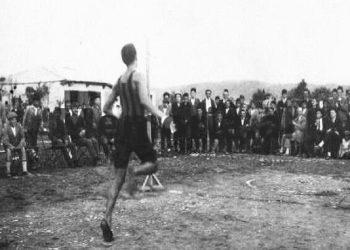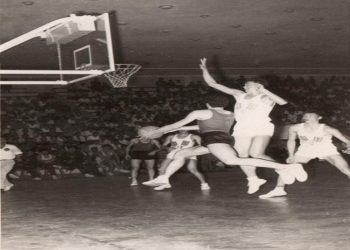Dashnor Kaloçi
Memorie.al publishes the unknown story of Eljaz Guri from Vraka Shkodra, one of the legends of wrestling in Albania for almost 25 years, who was spotted by the famous coach of the team “Vllaznia” Njac Lacuku who activated it with the youth team of that city, wherein 1962 Iljazi became national champion, defeating famous athletes such as Halil Stojku “Dynamos”, etc., and a year later he competed with the adult team of ” Vllaznia ”, where he came out in second place and then as a national champion. Eljaz’s transfer to the “Partizani” team, after the interest of the famous coach Luigj Deda and his victories over the great masters of Albanian wrestling, such as Mirash Vuksani of “Vllaznia”, Stefan General, Mark Curri and Piro Kokalar of “Partizani” Asim Omurin of Sport-Club Tirana, Hasan Porova of “Dinamo”, known by the nickname “Animals”, etc. Guri’s participation in international activities where he defeated the great Romanian champions, Maneo Dimitru and Maneo Bushul, during the tournament held by their team in Albania in 1970. Participation in the European Wrestling Championship in Finland in ’72, where Eljazit was asked to leave the match to the Finnish wrestler, as his victory, which was in fact quite easy, would automatically lead him to the final for the first and second place with the Russian wrestler, with whom the Albanians refused to face… The Stone Incident at the hotel with the Russian wrestler who refused to shake his hand, saying, “You have betrayed Marxism-Leninism” and the non-acceptance of gifts from Finns who went wrong with the Russians. Leaving the sport in 1985, where at the ceremony held at the Stadium “Vllaznia”, they donated a book by Enver Hoxha and in the enterprise, the distillery “Distinguished Editor”, as well as the continuation of that sport by his son, Elisi, who came out world champion with Bulgaria in 2011.
Shkodra, the city with ancient history and traditions, since the first years of the last century and then, among other things, has produced dozens and dozens of talented athletes, who have made a great name by enlivening this city and wherever they have been active with other and national teams. The names of famous Shkodra athletes are already known, great masters such as Loro Boriçi, Pal Mirashi, Kolec Kraja, Mehdi Bushati, Ramazan Rragami, Din Zhega, Sabah Bizi, Astrit Hafizi, Ferit Rragami, Hysen Zmijani, Fatbardh Jera, Arvit Hoxha, Lul Bërshemi, etc., in football, Petrit Osmani, Renato Radoja, Filip Guraziu, Refik Vorfa, Nikolin Pali, Zef Gjoni, Mehdi Bajri (Vishnja), Sokol Kalaj, Marin Shestani, Korab Llazani, Bledar Gjeçaj, Afrim Bilali, etc., in basketball, Ali Bushati, Gjino Mjeda, Gjon Çoba, etc., in volleyball, where most of them also represented the colors of the national team of Albania by successfully competing in international activities. But in addition to these well-known names and legends of Albanian sports, that city has produced many well-known names in other sports, such as. in heavy sports (boxing, wrestling, and weightlifting), such as Asim Belinova, Xhovalin Çuni, Faruk Kalleshi, Genc Barkiqi, Esat Ademi, etc., in weightlifting, Ramiz Halili, Dervish Hebovija, Viktor Martini, Besnik Gjetja, Edmon Hoxha, etc., in boxing, Luigj Deda, Mirash Vuksani, Eljaz Guri, Hysen Omi, Paulin Sterkaj, Seit Fishta, Paulin Merlaj, Sander Leka, etc., in wrestling, and many, many other athletes in other sports disciplines that Shkodra knows them better, for which it would take whole pages of newspapers to describe their successes. But among these famous athletes of Shkodra, undoubtedly a special place is occupied by the “Merited Master of Sports”, Eljaz Guri, who for years has been a national champion in the sport of wrestling, representing the red and black colors of Albanian representatives in many international meetings inside and outside the country. But who is Eljaz Guri, what is his past and how did he manage to become one of the most famous athletes in the sport of wrestling? Regarding this and full of facts and other events unknown from his life and sports career, Eljazi himself knows us, in this exclusive interview for Memorie.al.
Mr. Eljaz, first tell us something about your family?
The earliest origin of my family is from the Albanian territories that are today in Montenegro, but I was born (in 1945), in the village of Shtoj i Ri in Shkodra. While for years our family has lived in the village of Vraka, where I have completed the first lessons of primary and 7-year school. We were a large family (six brothers and four sisters) and our father, Seit Guri, was engaged in fishing, while the other members of the family, in various jobs of the agricultural farm. Although as I said, we have been a large family, compared to others, we have been in a bad financial situation, being considered a middle-class family, in terms of living. In this family environment, I also grew up, until I approached and became active as an athlete in the ranks of the “Vllaznia” team of Shkodra in the early ’60s.
How do you remember your first beginnings in the sport of wrestling?
Initially, I was involved in the sport of athletics (in ten races), since I was a student at the 7-year school in Vraka, with a coach, Njac Lacuku, who at that time was a physical education teacher. From that school came some talented athletes who made a great name not only with the team of “Vllaznia” but also at the national level, such as Milan Vaso (defender of Vllaznia and the national team), Dushan Vaso, Ali Hamza, Bozho Ajko, Dese Jako, etc. I did not continue athletics for more than a year, and the reason for this was the wrestling coach of “Vllaznia”, Sul Rama, who while watching me every day waiting for some of my friends who were training there (like Dushan Vaso, Naim Pepa, Halil Gëlqerja, etc.), called me and invited me to enter the sport of wrestling. In addition to the great desire I had for that sport, he appreciated in me a very promising physique and so I ended up with wrestling, a sport which is my hometown and other surrounding villages, has had an early tradition. In addition to wrestling, sports and other popular games have been practiced in our area, such as: throwing and lifting the stone and heavyweights, pulling the rope, high dances, etc., which took place on various holiday occasions. And many of the future athletes of “Vllaznia” of Shkodra have stood out from these popular games. Even today in our house in Vraka there is a large stone in the yard, which we have been inheriting for more than 150 years. Many kind friends who come to our house trying to lift or move the stone from which we have the surname Guri.
What were your first results when you approached the sport of wrestling?
In 1962, I started training for the first time with the youth of “Vllaznia”, while a year later, I won all the matches, reaching the final with Halil Stojku of “Dinamo”, who was the absolute champion for four years. He beat me with points and I took second place in the meetings that took place in the playground “Spartak” of Shkodra, where I had extraordinary support from hundreds and hundreds of fans who followed with great interest those meetings. After these results, I was given a special food treatment, as a promising athlete, and in the next two championships that took place in Korça, I took first place.
What about the first adult team of “Vllaznia”, when did you become active?
At the age of 19, I moved with the adult team of “Vllaznia” (with the well-known coach, Qazim Elbasani), and in the first championship I participated I took second place. I met in the park “Uncle Tomi” with Asim Omuri of Sport-Club Tirana, whom even though he was “Master of Sports”, I beat him hard. In the end, I took the second place, as the great master, Iljaz Ahmeti of “Partizani” had defeated me by points. During these meetings, I caught the eye of specialists and coaches, where one of them, the famous Luigj Deda of “Partizani” (originally from the village of Gajush in the Mata Coast in Lezha), came and asked me about my age. He then sent my name to the “Partizani” Club, where I was later drafted into the army, one day with the Master of Sports, Sabah Bizin.
How long did you stay in the ranks of “Partizani” and what results did you have there?
With the “Partizani” team, I activated for three years in a row, becoming the absolute champion and defeating some of the well-known opportunities, such as Mirash Vuksani of “Vllaznia”, Hasan Porova of “Dinamo”, (with the nickname “Dinamo Animals”), etc. My work and sweat in the “Partizani” Club were appreciated with many decorations, honorary cards, and various medals. But after three years when I had made a great name and stood out as a quality athlete, I was returned to the “Vllaznia” Club of Shkodra. The reason for this was a Flet-Rrufe that was put in the middle of Tirana by the Shkodra fans, who asked the government to return to Shkodra some of its best athletes who were active with the teams of the capital. I myself read that lightning bolt, whereas a pressure, the youth of Shkodra promised the government that it would be completed before the deadline of the Vau i Dejës Hydropower Plant. As we were told then, this fell on the ears of Prime Minister Mehmet Shehu, who had ordered: “Everyone should return urgently to Shkodra, with Biz and whoever it is. We are not joking with the hydropower plant. ” So after that, I returned to Shkodra together with Asim Belinova, Faruk Kalleshi, Vildan Tufi, etc. So from the “Partizani” team, I ended up at the Vau i Dejës Hydropower Plant, as a worker in the cementing brigade, where I do not forget the great support given to me by Sokrat Kalivopulli, whom we had as construction site director.
What was your further sports career with “Vllaznia” and how long did it last?
With the team of “Vllaznia”, I became the absolute champion for another three or four years, competing in the heavyweight, semi-heavy, and middleweight, according to the needs of the team. At that time I was stabilized in a room at the football stadium “Vojo Kushi” (today “Loro Boriçi”), and after a year, I was removed from Vau i Dejës and brought as an adjuster to the Wood Factory in Shkodra. With “Vllaznia” where I was treated with priority, I became active regularly until 1985, coming out sometimes national champion and sometimes in second places.
During those years, who were some of the athletes competing with you in your weight class?
I had the strongest competition with Stefan, the General of “Partizan”, Mark Curri, Pirro Kokalar, etc.
During those years of your sports career, did you attend international meetings?
I had my first international meeting in 1970 at the Partizani Sports Palace in Tirana, with the Romanian wrestler Maneo Dimitru, whom I won by points. The Romanian team had come to Albania to hold a series of friendly matches with our teams, in the context of the preparations he was making for the world championship. After two days, the Romanian team came to Shkodra, where I met again with Dimitri, whom I threw into the swing for 30 seconds. I will not forget the cheers and long applause of 3-4 thousand Shkodra fans who had filled the stairs of the stadium. After a few days, the Romanian team went to Durrës for the third meetings and there Dimitru asked me for revenge. With the understanding of both parties, it was agreed that we would play the match, where I would compete as a member of the “Student” team, and again I defeated it. There in Durrës, the coach of “Partizani”, Luigj Deda, came to follow me, who guided me with his advice. After 5-6 months, we went to Bucharest to visit the Romanians. I managed to win the first three games and lost only to the great Romanian master, Neguc, who was the world runner-up. My loss came as a result of the insufficient psychological preparation I had for such meetings and the heavy emotional load. This was my first meeting abroad. The Romanians came again for a tour in Albania and I won eight matches in a row in Tirana, Shkodra, etc. The most difficult match for me was the one with Maneo Bushul, who until the last moments of the match, led with 8 points 2. In the limit of the last seconds of the match, I threw it in the heel. And the whole stadium, which had been holding its breath for minutes, burst into applause. This has been one of the most beautiful victories of my life. A year later, as captain of the national team, I participated in the European Championship that took place in Katowice, Poland, where due to an injury, I can only play one match.
In which international meetings have you had the highest scores?
In 1973 our national team participated in the matches for the European Championship that took place in Finland. In that championship, after I passed the first three rounds with clear and undisputed victories, I met to face the countries from third to sixth, with a Finnish wrestler. If I beat the Finn, which was more than possible, I would have to face him in the final for first and second place with a Russian wrestler. Whose hand was only on the carpet at the beginning of the match, so I just appeared in the match, I was automatically the world runner-up after him. But because our national teams of all sports at the time refused to face the Russian, American and Israeli teams, the heads of our sports delegation instructed my coach that I would lose the game by points so that I would not face them. with the Russian. But this had to be done with great finesse, for if understood, the team would receive a great deal of punishment from the world wrestling federation.
How did this match go …?!
Based on this situation, coach Ludovig Bogoi, guided me to resist with finesse and lose with small points, for the match to be won by the Finn with the result 2 to 1. But during the meeting, since I was used to fighting hard and without compromise, the coach yelled at me and reminded me of the order. This caught the eye of the judiciary and became a major problem. During the banquet that was organized on the occasion of the end of the championship matches, the Russian coach approached me and extended his hand to congratulate me on the matches I had played. But according to the orientations we had, I not only did not shake his hand but taking advantage of the fact that I knew the Slavic language, I said: I will not give up because you have betrayed Marxism-Leninism. Which led to confusion and serious incidents. A Bulgarian wrestler who was near me said, “How is it possible for you to say these words to this great Russian, how many millions of Albanians are you who are so brave ?!” When I proudly said, ‘We’re three million when we eat bread, but we’re 300 million when we catch the rifle,’ they left in surprise without saying a word.
What did the heads of the delegation say to you?
The bosses came and congratulated me on the attitude I had held towards the Russian. After the incident, my Russian opponent approached me, with whom we had a debate, and I said the same words I had said to his coach. He was Georgian and out of love for Stalin, he said, “Yes, you Albanians are right.”
When you returned to Albania, did you have any congratulations or rewards for the three matches won and the attitude you held towards the Russians?
Honestly, when we landed in Rinas, I thought that they would come out to receive us and congratulate us, the senior chief of the “Partizani” Club, the Wrestling Federation, etc., from the government, but not that no one waited for us, nor a vehicle to ‘We left Rinas for Tirana, we didn’t have it.
What did you travel with?
My trip to Shkodra is a story in itself and I will never forget it, as it took me two days to get close to my family in Vraka. Initially, in Rinas, I took out a Zuk (Polish vehicle) that had come there to take the empty coffers of the arrangements, and with it, I traveled to Zogu i Zi in Tirana. From there I walked to the train station, to catch the passenger train that was then going to Laç, but he had fled and I was forced to go back to the vehicle agency, which at that time was somewhere below the Black Bird, nearby. Lapraka, to find a car for Shkodra. After waiting in vain for several hours, I met an army comrade by chance, who suggested that I go back to the train station, as at that time the work trains to Laç would depart.
Did you go there again?
I went immediately and without asking anyone I boarded an open wagon loaded with bitumen barrels. The train stopped at Gjorm station, a few kilometers away. without going to Lac, and there I went down and went out on the national road to find a car. It didn’t take long for a coal truck to stop me in my carriage, and I traveled with it to the city of Lezha. Since no car was moving to Shkodra, I was forced to sleep in a hotel that night, where I could barely find a bed in a triple room. The next day I went out late on the road and with a car in the carriage, I went to Shkodra, where some of my friends stopped me for lunch, talking to them at length about the matches we had played in Finland. In the afternoon I found a cart and with it, I went to my village Vraka, which was covered by the twilight of the evening. When I entered the house at 7 pm, my father said to me: “Why are you so late? I find someplace, support him without the noise because the slaves of the house are sleeping.” I could hardly find it a place to sleep, as we were 10 kids, all older than me, and very close at home. Not only during that sleepless night but also during my trip to the coal or train wagon, I brought with me the rewards and gifts that had been offered to me in Finland.
What gifts?
After the matches in Finland, I was met by some leaders of the Finland-Albania Friendship Association, who offered me gifts: a new Benz car and some sports uniforms. At that time the Finns were doing badly with the Russians and given my attitude towards them, they wanted to reward me. But given the fact that we Albanian athletes had strictly stopped accepting gifts, I naturally rejected them, saying: thank you, but I have the best “Benz” in Albania. (Actually, I didn’t even have a bike at home). I received them only a few sports sets and nothing else. I kept four of them for myself and shared them with others.
What about in Albania during your sports career did you receive any material reward?
In 1986, when during a football match in the stadium “Vojo Kushi” of Shkodra was organized the farewell ceremony of sports by Faruk Kalleshi, Refik Vorfa, and mine, they gave us a book by Enver Hoxha, which even today I keep it at home together with the decorations and medals that the People’s Assembly of Albania awarded me in those years as a “Distinguished Groom”, of the Wood Factory.
But after the ’90s, where did you work?
After the ’90s, I worked in various private construction projects and other facilities that are owned by my friend, Seit Fishta, whom I once trained. But moreover, I took care of the mosque you see here (in the center of the city of Shkodra), which was financed by Seiti, and I am very grateful to him.
After leaving the wrestling sport, did you become active as a coach to share your experience with young people?
For several years I worked with passion as a deputy coach of “Vllaznia” transmitting the experience I had with the youngest athletes, such as Pauli Sterkaj, Paulin Merlaj, Seit Fishta, etc., who became famous athletes not only with the team of ” Vllaznia ” but also in international meetings. I then devoted myself to my eldest son, Elis, who, at the age of 23, had been a 96 kg national champion for four years. with the “Partizan” team. The other son, Saiti, has also been involved in sports and has been active with the football team “Vllaznia” of Shkodra for several years.
Eljaz’s son, Elis Guri, Gold Medal and World Champion at the 2011 World Wrestling Championships
The famous master of wrestling and the absolute champion of Albania for several years, Eljza Guri, has shared his experience with his eldest son, Elisi, who although he graduated in Athletics at the Academy of Sports in Tirana, for several years has been the absolute champion in wrestling in the weight of 96 kg. with the Partizan team. In this regard, Eljazi testifies: “Elisi had the will and passion to be admired and worked hard in training. He has participated in several international meetings, and thanks to the preparation he had made in those years with his coach, Pirro Zguro from Vlora, in the matches held in Italy in 2005, Elisi took second place in the world. After that, he went to Georgia, where he trained in the Olympic Games to be held in Beijing, in August 2008, where he was ranked eighth in the world. Before moving to Georgia, Elise trained for two months in Bulgaria, whereas a coach, she had the Bulgarian I had once debated in 1973 in Finland, during the incident I had with the Russian coach. Elis speaks several foreign languages, and the Bulgarian coach has kept him close constantly, assessing him as a very strong opportunity “, testifies Eliazi for his son, Elis, who after these high results were forced to leave Albania and to compete for Bulgaria, as the Wrestling Federation in Tirana and the Albanian state could not meet its economic demands. So on September 13, 2011, Elis Guri took first place in the world in the weight up to 96 kg., Receiving the Gold Medal at the World Wrestling Championship./Memorie.al




